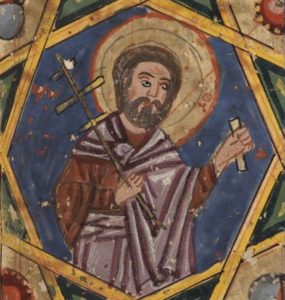Feast Day ~ January 29
 He had everything a young man could wish for: wealth, social prominence, an excellent education, a lucrative position as a lawyer, a beautiful wife from one of the best families. What more could Sulpicius Severus have asked for?
He had everything a young man could wish for: wealth, social prominence, an excellent education, a lucrative position as a lawyer, a beautiful wife from one of the best families. What more could Sulpicius Severus have asked for?
It is especially true for someone who “has it all” that one event can change his life forever, and that is what happened to this young man. His wife, who had yet to bear them a child, died suddenly and left Sulpicius, now a widower, to examine his life more closely. Was his wealth, his profession, his social status really so important? Our circumstances may not be the same as that of Sulpicius, we may not experience a life-changing tragedy, but there is much that we can learn from his response that we can apply to our own lives.
Sulpicius now rejected the importance of material things in favor of living a simple life of prayer. He moved to a small cottage in a village in Aquitaine and changed his diet to one without meat. He freed the slaves which he had owned, he sold much of his estate and gave the money for the poor, and kept some property to use the rental proceeds to help others in need. Can we do without luxuries and share more of our wealth with the poor?
Sulpicius’ father was furious with his son for giving up the good life and most of his friends abandoned him when he began a semi-monastic life. Can we resist the influence of those around us who would condemn us for our faith?
All this happened around the year 390, About seventy years after Christianity had been made the official religion of the Roman Empire. As memories of the persecutions before Emperor (St.) Constantine had faded somewhat, some people had become Christians out of a sense of “civic duty”. Sulpicius wanted to live his faith in a more deliberate, committed way. He also wanted to give to God and his Church the best that he could offer. After the dispersal of his wealth, the best that he could offer was his knowledge and abilities as a scholar and writer. He took on the task of writing a sacred history of the world, recounting all the events in the Old Testament, omitting those of the Gospels as having already been told perfectly, and telling the story of the Church up until his own time, the year 400. Do we offer to God whatever it is that we do best? Do we use our talents and abilities in service to God and his Church?
Sulpicius was a friend of Paulinus, the bishop of the city of Nola. Letters written between the two are extant and reveal the way in which each encouraged the other in their spiritual pursuits. Some of Sulpicius’ correspondence with his sister, Claudia, also still exist, which show his love and concern for her spiritual welfare as well as that of his friend Bishop Paulinus. Do we show our love and concern for our fellow Christians and do we seek their support and encouragement in our lives?
Perhaps the greatest influence on Sulpicius was that of someone who was a living saint in his time, St. Martin of Tours. That great bishop and monk served as an example of holy living for the young man, who visited St. Martin several times before his death. He listened to the saint’s teachings and tried to follow his counsels. He wrote the story of Martin’s life and spent several years in the saint’s cell in Marmoutier (near his see city of Tours) following his death. Do we look for examples of holiness and counsel for our lives to the saints of the Church and to those still living whose lives are worthy to emulate?
St. Sulpicius Severus spent the remainder of his life in a monastery in Marseilles, which had been founded by St. John Cassian in 407 while much of Gaul was being invaded by the Vandals and other barbarians. Marseilles was the seat of government from 407 to 410, thus providing safety from these attacks. When we feel threatened by the violence and chaos of the world around us, do we seek the safety of the Church? Do we rely on the ordered life of worship, prayer, study, fasting, and penance which the Church provides?
St. Sulpicius Severus passed from this life to the next on January 29, around the year 420 and is named a Confessor of the faith. He did not work miracles and did not have to fight against heresies; he was not martyred for being a Christian, but was one of those very “ordinary” saints whose example we can easily follow. May we, like St. Sulpicius give of our wealth for the poor, resist the influence of those who reject the Christian way of life, offer our talents to God, share support and encouragement with our fellow Christians, strive to emulate those who have led holy lives, and maintain the orderly life which the Church provides. Holy Sulpicius Severus, pray for us.